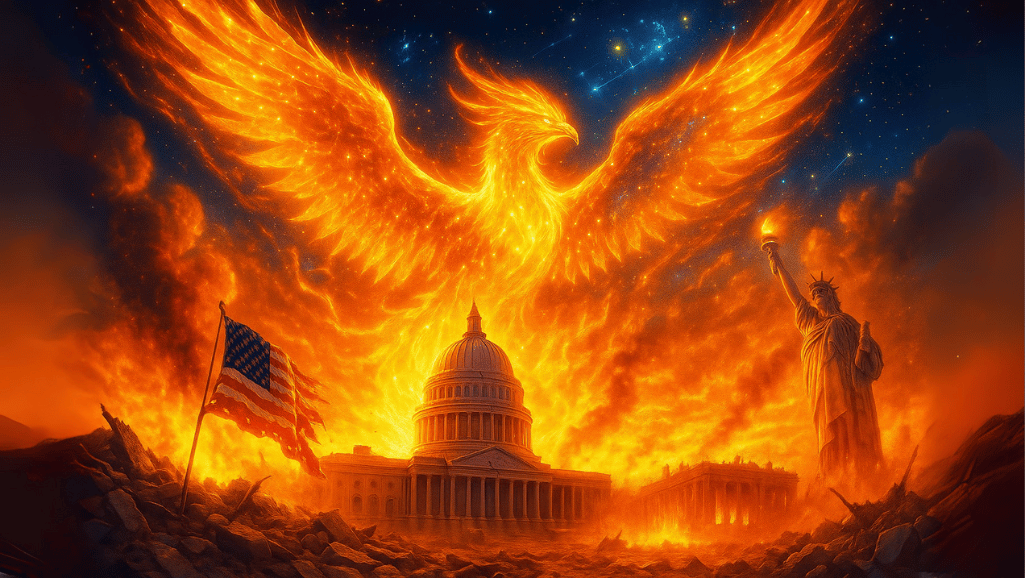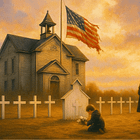It's The End of the World, As We Know It
History’s Blueprint for Collapse and Renewal: From the Death of One World to the Birth of the Next
If you’ve been watching the news this week and feel like the world is collapsing, you’re not wrong. Institutions are wobbling, systems are breaking, leaders are falling, trust is crumbling, and people are losing their minds trying to make sense of it.
Just this week, Japan’s Prime Minister Shigeru Ishiba resigned after crushing electoral defeats stripped his party of its majority, bowing out after less than a year in power.
France’s Prime Minister François Bayrou stepped down after losing a confidence vote on his austerity-driven budget. He was the fourth French PM in just over three years, leaving President Macron with approval ratings in the basement and the country edging closer to ungovernable.
In the UK, Angela Rayner resigned as Deputy Prime Minister, after being found to have underpaid £40,000 in stamp duty on a second home - a serious breach of the ministerial code.
Israel launched an airstrike in Doha, killing senior Hamas figures (and civilians) during ceasefire talks, enraging Qatar and derailing negotiations. At the same time, Israel ordered the full evacuation of Gaza City, displacing hundreds of thousands with no safe refuge. In Lebanon, Israeli drones dropped grenades dangerously close to UN peacekeepers, drawing condemnation as one of the worst breaches in years.
Nearly two dozen Russian drones crossed deep into Poland - which a U.S. lawmaker called an act of war - forcing NATO jets to scramble and shoot them down over alliance soil. Airports closed, debris fell, and Article 4 was invoked as Putin’s war breached NATO’s borders.
In Nepal, Prime Minister KP Sharma Oli resigned after anti-corruption protests in Kathmandu left 20 dead and hundreds injured. The unrest began with a ban on 26 social media platforms, seen as blatant censorship, and quickly spiraled - ministers quit, government buildings were attacked, and the home of ex-PM Jhala Nath Khanal was torched, killing his wife, Rajyalaxmi Chitrakar. Finance Minister Bishnu Paudel was even chased, beaten, and humiliated in the streets, a raw display of how deeply public fury has stripped Nepal’s leaders of their authority.
And in the United States, the violence came home in the starkest way: Charlie Kirk, conservative activist and co-founder of Turning Point USA, was assassinated on stage at Utah Valley University. Shot in broad daylight, in front of a crowd, by a sniper hidden nearby. Just three months after Minnesota’s House Speaker Melissa Hortman was gunned down in her own state, America has now witnessed two political assassinations in a summer. One Democrat. One Republican. Different sides of the aisle, but the same rot: a democracy so frayed that bullets are doing the talking.
All of that happened just this week.
From Kathmandu to Paris, Tokyo to London, Warsaw to Gaza, Ukraine to Utah, this week the seams ripped open. Governments cracked, protests raged, and war spilled past its borders as old ways of ruling collapsed under their own rot.
Yes, it feels like the world is ending. Like there is no path forward from here. It’s easy to believe that all of human existence has made it thus far, but here, at this juncture, we have come to the end of the road. Surely the end must be nigh.
But the truth is, humanity has been here before - we just don’t remember it.
The last time the world shook like this, thrones toppled, revolutions ignited, and a whole new way of living was born. Back then, the old world ended and the world we grew up in was created, but now, that world is expiring. The wheel is turning again. We are not doomed, but we must live through collapse, on the way to yet another new world.
Nobody alive today remembers the last time this happened, but the history books do. And if we look back, we’ll see the blueprint for what comes next.
The Sky Remembers
History doesn’t just march forward in a straight line - it turns on great wheels. Civilizations rise and fall, ideas bloom and wither, and what feels like chaos in the moment often turns out to be part of a larger rhythm.
There are many ways we observe that rhythm. We use calendars to track the days, months, and years, so we know that in the northern hemisphere, when the calendar hits December, the air turns cold and snow may fall, and when July arrives, we pull out our bathing suits and bake in the sun.
But there are larger rhythms beyond the seasons. For thousands of years, humans have tracked the movements of the planets across the sky. Astronomers mapped their paths, while astrologers noted what happened on Earth when certain alignments appeared. And just like the Earth’s yearly orbit guarantees another winter, planetary cycles bring repeating patterns in human affairs, too.
Revolutions erupt under one set of skies. Wars break out under another. Technological booms arrive on schedule, just as they did centuries before.
These aren’t coincidences, and the planets aren’t making anything happen. They’re markers - cosmic timestamps in a cyclical pattern. Each cycle leaves a fingerprint on history, and when the same configuration shows up again, the world tends to rhyme with its past.
Right now, we’ve arrived at one of those rare alignments - one we haven’t seen for over two centuries - and the last time it happened, the old world collapsed, and the modern world was born.
Pluto: The Great Excavator
Astrologers divide the sky into twelve sections, known as the zodiac, each with its own character and themes, and as each planet moves through each section it applies its own energy to the theme of that sign. (Don’t switch off - this isn’t woo - this is six thousands years of planetary pattern recognition, and you might be surprised at how accurately it predicts cycles)
Pluto is one of the slowest moving planets, taking 250 years to make a single lap through the zodiac, spending around twenty years in each sign. It’s often called the planet of death and rebirth - wherever it goes, it digs deep, unearths the rot, and forces transformation. Nothing stays the same under its gaze. It strips away what’s corrupt or exhausted and demands renewal.
Right now, Pluto has just entered the section of the sky called Aquarius, the sign connected to society, communities, technology, invention, and the question of how power is shared. This means transformation will strike in those arenas.
The last time Pluto moved through Aquarius, monarchs lost their crowns, revolutions reshaped nations, and the very idea of citizenship was born. Which means now, as Pluto returns here, we can expect another deep shake-up of how society is organized, and what kind of future we’re building together.
1777: When Thrones Fell and Nations Rose
The last time Pluto entered Aquarius in 1777, kings and queens in Europe ruled by divine right, nobles feasted while peasants begged for bread, and the Church held its grip on morality. That was “normal.”
But across the Atlantic, a spark had already lit the fuse. Just a year earlier, the Declaration of Independence was signed. A colony had dared to break away from its king, and suddenly the divine order of Europe didn’t look so divine.
By the time Pluto settled into Aquarius, the old world was cracking. In America, revolution raged as a new kind of nation struggled to be born - one where citizens, not subjects, held the power. In Europe, the pressure built until the Bastille was stormed, monarchs were dragged to the guillotine, and the centuries-old system of crowns and courts collapsed in blood and pamphlets.
Essentially, if you’ve seen the musicals Les Miserables or Hamilton, put them both together and that was the chaos Pluto’s last journey through Aquarius sparked.
It was an era of collapse, fear and hunger that was riddled with the sense that the world was ending. And in many ways, it was. The old world of kings and unquestioned hierarchies was over.
What died in that era was the European world of kings. What rose in its ashes was the blueprint for modern democracy - America’s republic, France’s Declaration of the Rights of Man, and the first ripples of human rights and citizenship.
It was the birth of what we know as the modern world.
Uranus in Gemini: The Spark That Lit the Fuse
At the same time that Pluto was in Aquarius in the 1770's, Uranus - planet of shocks, invention, and revolution - was in the part of the sky known as Gemini.
Gemini is the section of the sky linked to communication, information, and exchange that rules the airwaves, the messengers, the networks that carry ideas from one person to another.
So when Uranus, the cosmic disruptor, charges through Gemini, the result is a communications earthquake. Old narratives break apart. New technologies appear. Ideas spread like wildfire. Revolutions don’t just happen on the battlefield - they ignite in pamphlets, speeches, and the restless currents of conversation.
Together with Pluto in Aquarius, this was the double strike that set the world on fire. In America, colonists printed pamphlets that spread like wildfire - the 18th-century equivalent of viral posts - and declared themselves free from a king across the ocean. In France, radical tracts, café debates, and street posters carried the cry of liberty into every alley and salon. Ideas spread faster than soldiers could stop them, turning bread riots into the storming of the Bastille, and whispers of justice into the guillotine.
The last time Pluto and Uranus met in these exact signs, the United States was born, France was remade, and humanity lurched - through blood, famine, and terror - from monarchy to democracy. It was not clean or noble; it was pamphlets and barricades, guillotines and starving crowds. The new world did not arrive gently - it was dragged screaming from the ruins of the old.
Now, Pluto is back in Aquarius and Uranus is back in Gemini for the first time since the 1770s. And here we are once again, standing at the edge of one world’s collapse and another’s beginning.
When the World Fell Apart
It’s easy to romanticize revolutions when we compress them into a few lines of history. But for the people who lived through the French or American revolutions that unfolded the last time Pluto and Uranus hit their marks in the sky, it was terror, hunger, and daily survival.
In Paris, the price of bread soared so high that families spent almost all their wages just to eat. When bakers ran out, riots erupted. Mothers dragged their starving children through the streets, demanding food while soldiers tried to hold them back. People broke into bakeries, seizing loaves, sometimes killing each other for crusts.
The storming of the Bastille in 1789 wasn’t just a symbolic act - it was driven by desperation. A mob of thousands marched through the city armed with pitchforks, axes, and whatever they could find, convinced that seizing weapons from the prison was the only way to protect themselves from a corrupt monarchy.
By 1793, the guillotine stood daily in Paris’s main square. Crowds gathered to watch heads fall - first nobles, then clergy, then anyone suspected of “counter-revolutionary” leanings. Fear was everywhere. To speak a careless word could mean being denounced and dragged to the scaffold.
Marie Antoinette herself, once draped in silk and diamonds, was hauled through the streets in a plain cart, jeered and spat on. Her hair had turned white from stress in prison. When the blade fell, the crowd roared, not because life was better, but because rage had consumed everything else.
This was what the end of a world looked like: hunger in every home, violence in the streets, rulers humiliated and killed, entire systems collapsing with no clear path forward. It felt like civilization itself was dissolving.
Now here we are again. Today, this all feels strangely and uncomfortably familiar.
The Hardship of Revolution
The American Revolution looked heroic in hindsight - Jefferson’s words on parchment, Washington crossing the Delaware, freedom ringing - but for those who lived it, it was years of hunger, cold, and fear.
In the winter of 1777–78 at Valley Forge, Washington’s army nearly dissolved. Soldiers wrapped rags around their bleeding feet because they had no shoes. Thousands had no coats. Many starved or froze to death in their huts, and disease claimed more lives than battle. The dream of independence hung by a thread of human endurance.
Families were torn apart. Neighbors who sided with Britain were branded traitors; homes were burned, farms seized. Raids by Loyalists and Native allies turned the frontier into a patchwork of terror, where entire villages were emptied in the night.
Ordinary people paid the price in hunger and poverty. Inflation destroyed the colonial currency. A loaf of bread that once cost pennies could suddenly cost a month’s wages. Mothers watched their children waste away while their husbands fought in distant fields.
Freedom was not an abstract ideal. It was something bought with starvation, freezing nights, and the constant threat of death. For many, the revolution didn’t feel like the dawn of a new world - it felt like the end of the one they had known.
Out of the Ashes, A New World
The revolutions of the late 1700s that unfolded under Pluto in Aquarius and Uranus in Gemini were terrifying. They brought famine, bloodshed, and fear. But collapse always clears space for something new to grow, and what rose from that rubble still shapes our lives today.
In America, the colonies that bled through Valley Forge didn’t just survive - they birthed a republic. A brand-new form of government was written into existence, one that said power didn’t flow down from kings but up from the people. The U.S. Constitution and Bill of Rights laid down principles of free speech, assembly, and representation that still ripple across democracies worldwide.
In France, the guillotine toppled monarchs, but it also toppled the very idea of divine right. For the first time, ordinary people were declared citizens, not subjects. The Declaration of the Rights of Man proclaimed liberty, equality, and fraternity as universal values - words that went on to inspire abolition movements, suffrage campaigns, and civil rights struggles for centuries to come.
Even in technology, the upheaval opened doors. James Watt’s steam engine, spreading during Pluto’s time in Aquarius, fueled the Industrial Revolution. Factories, trains, and mechanized production remade economies. We still live in the world that began then - global trade, mass manufacturing, and eventually the digital age all trace their roots back to that moment.
We take for granted today so many things that were impossible before that collapse, like the right to speak against a government without being executed. The ability to vote, to gather, to have a voice. A world where power can change hands through ballots, not just bloodlines. Technologies that allow us to travel, connect, and build on a scale unimaginable in 1776.
The people who lived through those famines and fear didn’t know what was being born. All they knew was the collapse. But history shows us: that collapse was the clearing. Out of the ashes came the modern world.
Back to the Future’s Edge
Now, more than two centuries later, the cycle has returned. Pluto is back in Aquarius until 2043 and Uranus will be in Gemini until 2033. Together again - just as they were in the late 1770s - they are dismantling the world birthed back then, because the cycle says it’s time.
In the 18th century, collapse meant bread riots, mobs storming prisons, and monarchs dragged to the guillotine. Today, it looks like political assassinations, lone gunmen, misinformation campaigns, and digital mobs burning reputations instead of bakeries.
For years we have clapped along to Les Miserables and Hamilton as though their tragedies belonged to another age; the problems of a less-evolved civilization. When Fantine sold her hair, Marius grieved empty chairs and Hamilton fell in a duel, we consumed their pain as theatre, but those stories now no longer live safely on stage. Poverty is stripping people bare again. Empty chairs haunt our schools, churches, and communities. Political killings happen in broad daylight. And when the curtain falls today, there is no applause, only the choice of how we respond.
The painful collapse of the 18th century consumed what was rotten, clearing space for something new. Pluto’s passage through Aquarius then stripped away monarchies and hierarchies, making way for representative democracy, industrial technology, nation-states, global trade, capitalism, and the institutions we now treat as permanent: parliaments, constitutions, banks, universities, corporations.
Now, Pluto in Aquarius is holding those very institutions that blossomed out of the last collapse up for reckoning, putting a spotlight on broken democracies where trust has collapsed, industrial-age systems that poison the planet, top-down institutions that hoard power while people starve for voice, and digital empires that control information like monarchs once controlled land.
Meanwhile, Uranus in Gemini once again shakes the foundations of communication. The way ideas spread, the way we connect, the very language of truth and lies - it’s all breaking open. Social media already feels like pamphlet wars on steroids. AI, quantum leaps in tech, and new networks of organizing and storytelling are today’s broadsheets and presses setting revolutions on fire.
So what’s being birthed this time we don’t know the exact shape of yet, just as no starving Parisian in 1792 could have predicted smartphones or constitutions. But the fingerprints are clear:
A new form of democracy is being born, beyond ballots and broken parties. A technological revolution will force us to rethink ownership, privacy, and what it means to be human. Power is rebalancing from the center to the margins. And a planetary perspective is emerging, because unlike 1776, today’s crises are global - climate, migration, digital power, nuclear risk. The new world will not be born in one country, but everywhere.
Yes, it feels like collapse, because it is, but collapse is not the end - it’s the contraction before the birth.
What’s dying now are the systems created in the 1770s. What’s being born is the next era of humanity.
Surviving the End, Birthing the Beginning
Like it or not, Pluto and Uranus are in position and once again, collapse is here. It isn’t just on the news, it’s in the very design of the cycle. The same forces that toppled monarchies in the 1700s are active again now, and they are just as relentless, but it would serve us to remember that what feels like chaos is not random. It is the pattern unfolding, written in the sky.
We are not powerless in this process. Quite the opposite. The lesson of history is that when the old world cracks, survival and renewal come from the ground up. Ordinary people - not kings, not generals, not CEOs - are the ones who hold communities together and midwife the new.
If you’re feeling overwhelmed, flooded, panicked or anxious and the state of the world amidst this cycle of collapse, here’s some guidance for survival:
Stay grounded. Fear feeds the fire of collapse. Calm, steady presence keeps you sane when everything else wobbles.
Stay connected. The French had pamphlets, the Americans had taverns - today we have digital networks. Use them to build solidarity, not spread despair.
Stay creative. Every collapse clears space for invention. New ideas, new art, new movements are what carry humanity forward.
Stay courageous. People will tell you the end is final. It isn’t. It is the threshold. Have the courage to keep walking.
We can’t choose the cycle, but we can choose how we meet it. And if history is any guide, the world that is dying will not be the end of us. It will be the end of what no longer works, and the birth of something new that needs us alive, awake, and willing to build it.
We have been here before, and we will live to tell the story again.
The choice before us now is simple: will we face collapse with closed hearts or open ones? Will we fall into fear, or anchor in love? Will we crumble with the old, or stand steady to help birth the new?
Every time we choose love over fear, we lay a brick in the foundation of what’s to come. Every time we choose courage over cowardice, we clear the path forward. Every time we choose inner peace over outer noise, we steady the whole collective.
This is how we navigate collapse.
This is how we midwife the world that is to come.
My intention in my writing is to lessen the climate of fear around world events by offering clarity and cosmic context for what’s unfolding; to bring context to the chaos. I believe our highest calling right now is to anchor in the vibration of love & truth and call in a more beautiful world, and to do that, we must lean out of fear. I hope you read this with an open, uplifted heart.















Thank you. This is a great article to anchor us to reality in a dissolving world.
I really needed this. Thank you.
Choosing love is the path humanity needs to follow. May I be brave enough to do my small part in that choice.